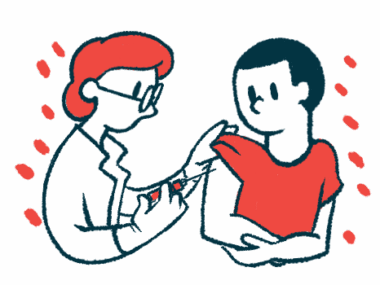We Don’t Know What We Don’t Know — But We Can Learn
Explaining hereditary angioedema to others can be tiring, but it pays off
Written by |

“Professor Jones!” my student wailed as she purposely dragged out the vowels in my last name. My level-three screenwriting class had been writing for almost an hour, and until her outburst, it had been relatively silent.
I watched as she ceremoniously marched her laptop up to my desk and then plopped down in the seat I reserved for students that needed help. “It’s not coming together,” she lamented.
She opened her computer to show me, and sure enough, what had started as a great flow of writing abruptly stopped mid-page.
“I’m not sure what to do with this character,” she continued, “and it’s frustrating because it’s veering from the summary.”
“Where’s your summary?” I asked. In a few short clicks, her summary appeared on the screen. As I scanned it, I realized I needed to go back to her script to compare the two. “Oh, I need to see–”
Before I finished my sentence, my student started clicking away on her computer. “Hold on, Professor,” she said as she right-clicked on tabs I never knew existed. Then, in the blink of an eye, the computer went into split screen mode, so we could simultaneously see her summary and script.
I was dumbfounded.
This student owned the exact computer model I did. Yet, she had managed to find a hack I never knew existed, one that could have saved me countless hours of clicking between two windows or, even worse, using my tablet as a second screen.
“Professor Jones?” she called for what I assumed was the second or third time. I shook my head and gave her my attention. I was excited that I could help her through her problem, but I knew that not being aware of what my computer was capable of would live rent-free in my brain for the rest of the day.
How could I not know? Better yet, how did I not know that I didn’t know?
This seems like a silly question. Of course, we don’t know things that we don’t know. That’s what makes learning new things so important. But sometimes, it’s frustrating when the light shed on a situation could have helped if it had happened sooner.
‘Angio-who?’
“What is this called again?” People would ask.
“Hereditary angioedema,” I’d reply.
I was used to this question. After our oldest daughter (nicknamed Ladybug) was officially diagnosed with hereditary angioedema (HAE) in 2021, I was grateful to have answers for teachers, school nurses, ER nurses, and hospital doctors. However, the answer wasn’t as simple as giving her illness a name. It was much more complicated than that.
I would often dive into an extensive explanation of Ladybug’s internal complications. On certain occasions when we were meeting a medical professional for the first time, I would find myself talking about all types of HAE, the medications needed, and how to administer them.
And when I think that a time will arise when our personal space won’t become the educational spot for HAE awareness, there’s always a new person, a new shift at the hospital, and a new doctor who is genuinely unaware this chronic illness exists.
Recently, after a minor shipping mishap with Ladybug’s Berinert treatment, we found ourselves in the ER during a flare. After being assessed by the nurse practitioner with whom we are very familiar, he introduced us to the nurse he was training.
It took me about five minutes to walk her through our journey with HAE, cluing her in on medications and treatments, and even mentioning the fantastic organization, the U.S. Hereditary Angioedema Association, that helps families navigate this illness daily.
“I had no idea I didn’t know about this,” she said.
I couldn’t help but smile. Even though we were in a hospital, Ladybug would end up having to spend the night, and even though I was somewhat frustrated with why we were there, that’s one more person that learned.
And maybe that’s how we spread awareness about these rare diseases that we live with or care for — ensuring that the people who don’t know finally do.
Note: Angioedema News is strictly a news and information website about the disease. It does not provide medical advice, diagnosis, or treatment. This content is not intended to be a substitute for professional medical advice, diagnosis, or treatment. Always seek the advice of your physician or other qualified health provider with any questions you may have regarding a medical condition. Never disregard professional medical advice or delay in seeking it because of something you have read on this website. The opinions expressed in this column are not those of Angioedema News or its parent company, Bionews, and are intended to spark discussion about issues pertaining to angioedema.




Leave a comment
Fill in the required fields to post. Your email address will not be published.